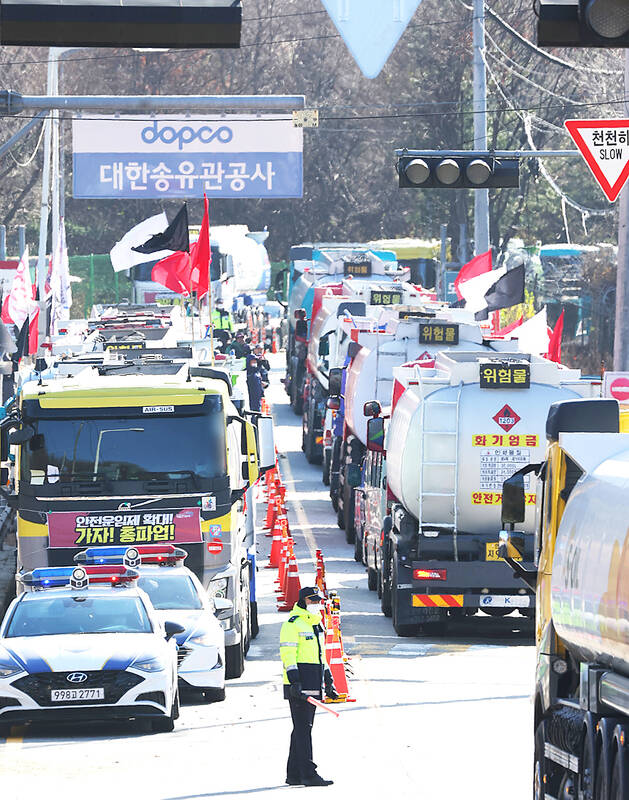A strike by South Korean truckers is estimated to have cost 1.6 trillion won (US$1.23 billion) in lost shipments, the South Korean Ministry of Trade, Industry and Energy said yesterday, as a lengthy strike becomes more likely with the government and union far from a compromise.
Disruptions to the nation’s supply chain expanded yesterday, the eighth day of the nationwide strike by more than 20,000 truckers, as the government prepares to order more of them back to work.
The cement, steel, auto and oil refining industries have seen 1.6 trillion won in lost shipments in seven days since the strike began last week, the ministry said in a statement.

Photo: EPA-EFE
This includes 562,600 tonnes of steel worth 731.3 billion won, 6,707 vehicles worth 319.2 billion won and 259,238 kiloliters of oil products valued at 442.6 billion won stuck in transit, it said.
No date has been set yet for the next round of negotiations.
Two people at the meeting on Wednesday said shouting erupted during the meeting between the government and strike organizer Cargo Truckers Solidarity Union.
The government has said it would not expand a minimum pay system for truckers beyond a further three years, which the union says should be permanent and wider in scope.
Kumho Tire Co Inc, South Korea’s No. 2 tire maker, which makes 65 percent of its sales from exports, said it is cutting 15 to 40 percent of output at its two factories until Tuesday next week because the strike has disrupted shipments.
The Korea International Trade Association said in a statement that fresh produce such as fish and kimchi had been scrapped because industrial hubs are blocked, without citing exact figures.
Exports at Samsung Electronics Co’s Gwangju plant, which mainly produces refrigerators and air conditioners, have been halted, although raw materials and other shipments were moving normally, Yonhap news agency reported, citing a plant official.
The government is preparing to potentially order oil industry truckers back to their jobs, the ministry said yesterday, after it issued an unprecedented order to force 2,500 cement industry truckers back to work this week.
As of Wednesday, 350 of those drivers had been served those orders. Refusing to get back on the road after a “start work” order can be punished by a fine or jail time, and cost drivers their licenses.
The ministry partly blamed the strike for the deterioration in exports, which last month fell the most in two-and-a-half years.
Total shipments fell 14 percent from a year earlier in the first double-digit drop since the middle of 2020, the ministry said in a separate statement.
Imports advanced 2.7 percent, resulting in a trade deficit of US$7 billion.
Exports of semiconductors plunged 29.8 percent and shipments to China declined 25.5 percent, the data showed.
Automobile shipments gained 31 percent, while exports of oil products rose 26 percent, the ministry said.
Additional reporting by Bloomberg

Stephen Garrett, a 27-year-old graduate student, always thought he would study in China, but first the country’s restrictive COVID-19 policies made it nearly impossible and now he has other concerns. The cost is one deterrent, but Garrett is more worried about restrictions on academic freedom and the personal risk of being stranded in China. He is not alone. Only about 700 American students are studying at Chinese universities, down from a peak of nearly 25,000 a decade ago, while there are nearly 300,000 Chinese students at US schools. Some young Americans are discouraged from investing their time in China by what they see

MAJOR DROP: CEO Tim Cook, who is visiting Hanoi, pledged the firm was committed to Vietnam after its smartphone shipments declined 9.6% annually in the first quarter Apple Inc yesterday said it would increase spending on suppliers in Vietnam, a key production hub, as CEO Tim Cook arrived in the country for a two-day visit. The iPhone maker announced the news in a statement on its Web site, but gave no details of how much it would spend or where the money would go. Cook is expected to meet programmers, content creators and students during his visit, online newspaper VnExpress reported. The visit comes as US President Joe Biden’s administration seeks to ramp up Vietnam’s role in the global tech supply chain to reduce the US’ dependence on China. Images on

Taiwan Transport and Storage Corp (TTS, 台灣通運倉儲) yesterday unveiled its first electric tractor unit — manufactured by Volvo Trucks — in a ceremony in Taipei, and said the unit would soon be used to transport cement produced by Taiwan Cement Corp (TCC, 台灣水泥). Both TTS and TCC belong to TCC International Holdings Ltd (台泥國際集團). With the electric tractor unit, the Taipei-based cement firm would become the first in Taiwan to use electric vehicles to transport construction materials. TTS chairman Koo Kung-yi (辜公怡), Volvo Trucks vice president of sales and marketing Johan Selven, TCC president Roman Cheng (程耀輝) and Taikoo Motors Group

New apartments in Taiwan’s major cities are getting smaller, while old apartments are increasingly occupied by older people, many of whom live alone, government data showed. The phenomenon has to do with sharpening unaffordable property prices and an aging population, property brokers said. Apartments with one bedroom that are two years old or older have gained a noticeable presence in the nation’s six special municipalities as well as Hsinchu county and city in the past five years, Evertrust Rehouse Co (永慶房產集團) found, citing data from the government’s real-price transaction platform. In Taipei, apartments with one bedroom accounted for 19 percent of deals last